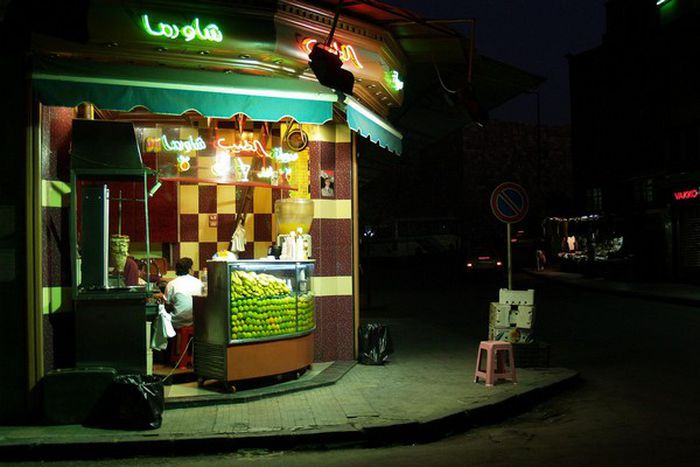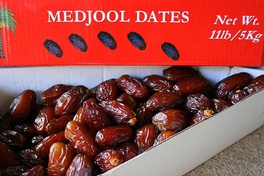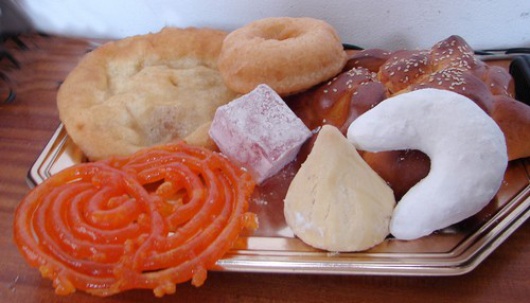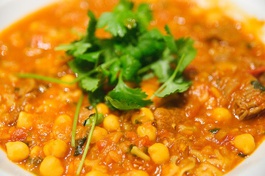
Ramadan: from Bologna with love
Published on
We’re hungry, and in a hurry. The evening sun is still strong enough to melt the tar between the cobbles. I’m in Bologna, Italy, and Badr is bringing me as a guest to iftar, the daily feast that breaks the ramadan fast.
The smell of frying assaults us round the corner before we even see the place. This is Cafe Azemmour, a small greasy spoon that serves kefta (spiced meat balls) and mint tea to Moroccan expatriates and kebabs to students coming home in the early hours. Hassan is seated on a chair outside. He looks even more jaundiced than usual. Nothing, whether water, food or coveted nicotine, has passed his lips for fifteen hours. He scowls towards the determined sun. The fast can be broken at precisely 19:43 today in Bologna, according to calculations. Four minutes earlier than yesterday.
 Badr shows me in the door. Once inside, a cacophony of smells greets the nasal passages. Something musty is emitting from an imposing black pot on the stove; spicy meat sizzles on the grill; delicate pastries glisten below the glass counter. Several men are slouching on the high chairs, waiting. The patron, Khalid, emerges from behind the counter and greets us with firm handshake. I am ushered towards a chair, and silence falls as we wait for the final five minutes to pass. A tense calm falls as we all watch a black fly meander at random. Someone’s stomach growls.
Badr shows me in the door. Once inside, a cacophony of smells greets the nasal passages. Something musty is emitting from an imposing black pot on the stove; spicy meat sizzles on the grill; delicate pastries glisten below the glass counter. Several men are slouching on the high chairs, waiting. The patron, Khalid, emerges from behind the counter and greets us with firm handshake. I am ushered towards a chair, and silence falls as we wait for the final five minutes to pass. A tense calm falls as we all watch a black fly meander at random. Someone’s stomach growls.
Hassan comes in from the street. It’s 19:43 by his watch, he insists. Badr goes immediately to the fridge and takes an armful of chilled water bottles, handing one to each pair of eager hands. They all drink with relief. Then, with a flourish, the plates of food are offered around. To start, dates. Never a fan of dates formerly, I suddenly appreciate their caramel chewiness as sweetness floods my mouth. Hassan, revitalised and merry, approaches me with a paper cup and fills it from a tall jug. The liquid is lightly foaming and mint green in colour. I sip it suspiciously. I will always remember this as the moment when I was converted to avocado milkshake. It is delicious and filling, and, allegedly, has the power to boost a man’s virility.
 The milkshake helps to wash down the rich treats I am being offered. Chabakia are crisp, honey-soaked almond pastries flavoured with saffron and orange water and sprinkled with sesame seeds, a traditional ramadan treat. Diamond shaped slices of sfouf, a Lebanese cake made with semolina, turmeric and pine nut, are handed round. These are joined by baghrir, light semolina pancakes with honey and melted butter.
The milkshake helps to wash down the rich treats I am being offered. Chabakia are crisp, honey-soaked almond pastries flavoured with saffron and orange water and sprinkled with sesame seeds, a traditional ramadan treat. Diamond shaped slices of sfouf, a Lebanese cake made with semolina, turmeric and pine nut, are handed round. These are joined by baghrir, light semolina pancakes with honey and melted butter.
Now for the savoury. Msamane is a salted pastry that has been fried to a hard, varnished consistency. I crunch happily through mine. Khalid approaches me with a plastic plate. On it rests a deep-fried fish head, its crusty eye socket looking blindly up at me. Tactfully, he diverts at the last second and hands it to another patron, swiftly producing another, less intimidating morsel. I place the side of fish straight into my mouth and crunch the bones with my molars. It is pungent. I am offered a boiled egg.
The atmosphere has become jolly. ‘If we were at my mother’s house’, Badr reminisces, ‘she would offer you such dishes...’. ‘Tagine,’ Khalid suggests from the kitchen. ‘A huge tagine,’ boasts Badr, ‘four different kinds of soup. Sweets. A roast lamb. Fish, not fish like this stuff...’ Khalid brandishes a spatula at this, but Badr is not to be deterred. ‘Fish that’s still living, it’s so fresh. She would spend the whole day preparing it. Then afterwards, we would all play a game of football. There are parties on the streets every evening during ramadan.’
The dish that comes out next is the crowning glory. It’s a bowl of harira, a thick traditional soup that can be lamb or vegetarian, and a meal in its own right. Despite my full stomach, I eagerly welcome each spoon into my mouth. I slurp down the noodles and crush the occasional chickpea with my tongue. Scooping up the last bits of lamb left the trough of the bowl, I sit back into a sated stupor. We take hot glasses of sweet mint tea, and all head outside for the long awaited first cigarette of the day. Miraculously, the street is dark, the sun has disappeared. Soon, for my fellow diners at least, the fast will begin again.
Recipe for harira soup
 • 500g lamb cut into small cubes • 1 teaspoon tumeric • 1 teaspoon pepper • 1 teaspoon cinnamon • 1/4 teaspoon ginger • 2 Tablespoons butter • 90ml cup chopped celery and leaves • 2 onions, chopped • 50ml cup parsley chopped • 250g can of tomatoes, chopped • salt
• 500g lamb cut into small cubes • 1 teaspoon tumeric • 1 teaspoon pepper • 1 teaspoon cinnamon • 1/4 teaspoon ginger • 2 Tablespoons butter • 90ml cup chopped celery and leaves • 2 onions, chopped • 50ml cup parsley chopped • 250g can of tomatoes, chopped • salt
• 90ml lentils
• 240ml cup chickpeas (canned are fine)
• 30ml cup fine soup noodles
• 2 eggs, beaten with the juice of 1/2 lemon
Add the lamb, butter, spices, celery, onion and parsley into a large pot and stir together for 5 minutes over a low heat
Add the tomato, and cook for another 15 minutes. Add salt and 1,5 litres of water
Bring to a boil, reduce heat, and simmer for 2 hours
When ready to serve, add the chickpeas and noodles and cook for 5 minutes
Then, with the soup at a steady simmer, stir the lemon-eggs into the stock with a long wooden spoon
Continue stirring slowly, to create long egg strands and to thicken the soup
Season to taste. Ladle into bowls and dust with cinnamon
Can be served with slices of lemon to squeeze in according to taste
Enjoy!
First published on 25 August 2009 on cafebabel.com



